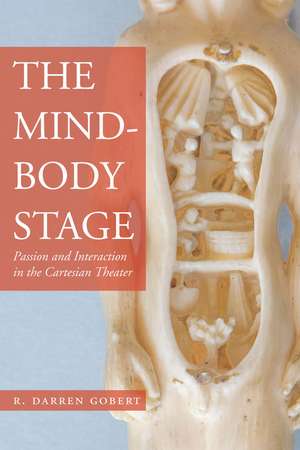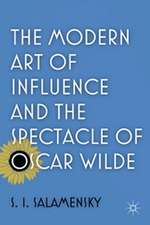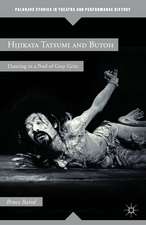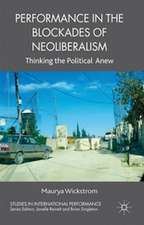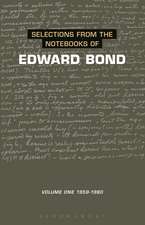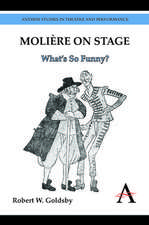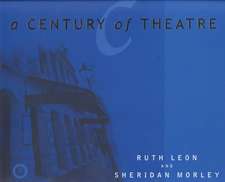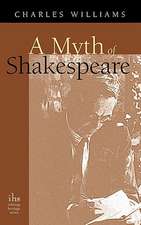The Mind-Body Stage: Passion and Interaction in the Cartesian Theater
Autor R. Goberten Limba Engleză Hardback – 20 aug 2013
Descartes's notion of subjectivity changed the way characters would be written, performed by actors, and received by audiences. His coordinate system reshaped how theatrical space would be conceived and built. His theory of the passions revolutionized our understanding of the emotional exchange between spectacle and spectators. Yet theater scholars have not seen Descartes's transformational impact on theater history. Nor have philosophers looked to this history to understand his reception and impact. After Descartes, playwrights put Cartesian characters on the stage and thematized their rational workings. Actors adapted their performances to account for new models of subjectivity and physiology. Critics theorized the theater's emotional and ethical benefits in Cartesian terms. Architects fostered these benefits by altering their designs.
The Mind-Body Stage provides a dazzlingly original picture of one of the most consequential and confusing periods in the histories of modern theater and philosophy. Interdisciplinary and comparatist in scope, it uses methodological techniques from literary study, philosophy, theater history, and performance studies and draws on scores of documents (including letters, libretti, religious jeremiads, aesthetic treatises, and architectural plans) from several countries.
The Mind-Body Stage provides a dazzlingly original picture of one of the most consequential and confusing periods in the histories of modern theater and philosophy. Interdisciplinary and comparatist in scope, it uses methodological techniques from literary study, philosophy, theater history, and performance studies and draws on scores of documents (including letters, libretti, religious jeremiads, aesthetic treatises, and architectural plans) from several countries.
Preț: 340.89 lei
Nou
Puncte Express: 511
Preț estimativ în valută:
65.24€ • 67.86$ • 53.86£
65.24€ • 67.86$ • 53.86£
Carte tipărită la comandă
Livrare economică 15-29 aprilie
Preluare comenzi: 021 569.72.76
Specificații
ISBN-13: 9780804786386
ISBN-10: 0804786380
Pagini: 264
Dimensiuni: 152 x 229 x 18 mm
Greutate: 0.48 kg
Ediția:New.
Editura: Stanford University Press
Colecția Stanford University Press
ISBN-10: 0804786380
Pagini: 264
Dimensiuni: 152 x 229 x 18 mm
Greutate: 0.48 kg
Ediția:New.
Editura: Stanford University Press
Colecția Stanford University Press
Recenzii
"A major contribution to the burgeoning field of theatre and philosophy, The Mind-Body Stage shows that Descartes's meditations on subjectivity changed the way character was conceived, that his study of geometry literally reshaped theatrical space, and that his theory of the passions revolutionized conceptions of the emotional dynamic between spectacle and spectator . . . The Mind-Body Stage breaks new ground. Its theoretical rigour, historical depth, and acute analysis will contribute substantially to new work on the relation between theatre and philosophy. It should be required reading for anyone who cares about theatre, drama, and intellectual history."—Alan Ackerman, Canadian Theatre Review
"This intriguing study fulfills the promise to trace the hidden role that Cartesianism played in theater history in the seventeenth century—and beyond."—Erec R. Koch, Modern Philology
"The strength of R. Darren Gobert's book, The Mind-Body Stage: Passion and Interaction in the Cartesian Theater, is to align itself not with Cartesian dualism but with the theatrical proofs of Descartes's cultural relevance in the creation of the plays, performances, and even the theatrical architecture of his time . . . Gobert successfully illustrates the ways in which Cartesian philosophy has been coterminous with meaningful changes in the theatre of interrelationship, whose borders are constantly in and at play."—Spencer Golub, Comparative Literature Studies
"The strength of Darren R. Gobert's The Mind-Body Stage is in the creative and compelling layering of theatrical developments in playwriting, acting, and theatre architecture onto the philosophical writings of Rene Descartes . . . [T]his book [is] a fantastic resource for students of theatre as well as theatre historians."—Megan Macdonald, Theatreforschung
"R. Darren Gobert's elegant The Mind-Body Stage represents a significant scholarly and stylistic accomplishment . . . Gobert has made an important contribution to the wider intellectual discourse on the widely variegated terrain currently described as performance philosophy . . . [T]he text is an exemplar of finely tuned, witty, and compelling scholarship that will most certainly have a significant influence in theatre and performance studies, as well as in a variety of related interfields and emergent interdisciplinary constellations of thinking."—David Fancy, Theatre Research International
"...Gobert is at his best, combining his facility with close readings of text and rigorous analyses of material history to shed light upon the 'quarrel' surrounding Moliere's School for Wives . . . [T]he reader feels not exhausted by the author's thoroughness, but impassioned by it."—Brad Krumholz, Theatre Research in Canada
"This year's winner of the Barnard Hewitt Award for Outstanding Research in Theatre goes to a book that the jury unanimously found unique and surprising. It enters the realm of seventeenth-century philosophy and finds there the key to understanding the profound influence it exerted in drama, stagecraft, playhouses, and performances—influences that would shape not only theatre throughout the eighteenth century, but theatre to the present day. Meticulously researched, the book traces the influence of mind-body dualism through literary and material manifestations: in Swedish court ballet, French classical tragedy, and English burlesques, as well as in theatrical architecture, design, and acting practices. This book demonstrates not only solid research but the kind of innovative thinking that moves our field forward. Congratulations to Darren Gobert for The Mind-Body Stage: Passion and Interaction in the Cartesian Theater."—Mechele Leon, Barnard Hewitt Award for Outstanding Research in Theatre Committee Chair
"[A] scholarly tour-de-force . . . Gobert has done a great service to scholarship in both the history of philosophy and theatre studies and helped Descartes take a further step onto the stage of the world."—William Egginton, Theatre Journal
"With the publication of Gobert's book, no longer can we see the Cartesian subject as a pure mind disconnected from others or the 'emotional cocktails' that constitute experience. His fascinating and original discussion of Descartes's theory of the passions and the mind-body union is a must for scholars of early modern literature and drama, historians of philosophy and of science, and philosophers of mind and neuroscience."—Patricia Easton, Claremont Graduate University
"A terrific contribution to the growing literature on theater and philosophy, The Mind-Body Stage shows us a Descartes who writes ballet and who sees his thought dramatized by Corneille and enacted by Moliere. Far from being mortal enemies, theater and philosophy engage in a passionate pas de deux from which emerges nothing less than a Cartesian Theater."—Martin Puchner, Harvard University
"...Gobert is at his best, combining his facility with close readings of text and rigorous analyses of material history to shed light upon the 'quarrel' surrounding Moliere's School for Wives . . . [T]he reader feels not exhausted by the author's thoroughness, but impassioned by it."—Brad Krumholz, Theatre Research in Canada
"This year's winner of the Barnard Hewitt Award for Outstanding Research in Theatre goes to a book that the jury unanimously found unique and surprising. It enters the realm of seventeenth-century philosophy and finds there the key to understanding the profound influence it exerted in drama, stagecraft, playhouses, and performances—influences that would shape not only theatre throughout the eighteenth century, but theatre to the present day. Meticulously researched, the book traces the influence of mind-body dualism through literary and material manifestations: in Swedish court ballet, French classical tragedy, and English burlesques, as well as in theatrical architecture, design, and acting practices. This book demonstrates not only solid research but the kind of innovative thinking that moves our field forward. Congratulations to Darren Gobert for The Mind-Body Stage: Passion and Interaction in the Cartesian Theater."—Mechele Leon, Barnard Hewitt Award for Outstanding Research in Theatre Committee Chair
"[A] scholarly tour-de-force . . . Gobert has done a great service to scholarship in both the history of philosophy and theatre studies and helped Descartes take a further step onto the stage of the world."—William Egginton, Theatre Journal
"With the publication of Gobert's book, no longer can we see the Cartesian subject as a pure mind disconnected from others or the 'emotional cocktails' that constitute experience. His fascinating and original discussion of Descartes's theory of the passions and the mind-body union is a must for scholars of early modern literature and drama, historians of philosophy and of science, and philosophers of mind and neuroscience."—Patricia Easton, Claremont Graduate University
"A terrific contribution to the growing literature on theater and philosophy, The Mind-Body Stage shows us a Descartes who writes ballet and who sees his thought dramatized by Corneille and enacted by Moliere. Far from being mortal enemies, theater and philosophy engage in a passionate pas de deux from which emerges nothing less than a Cartesian Theater."—Martin Puchner, Harvard University
Notă biografică
R. Darren Gobert is Associate Professor of English and Theatre Studies at York University, Toronto.
